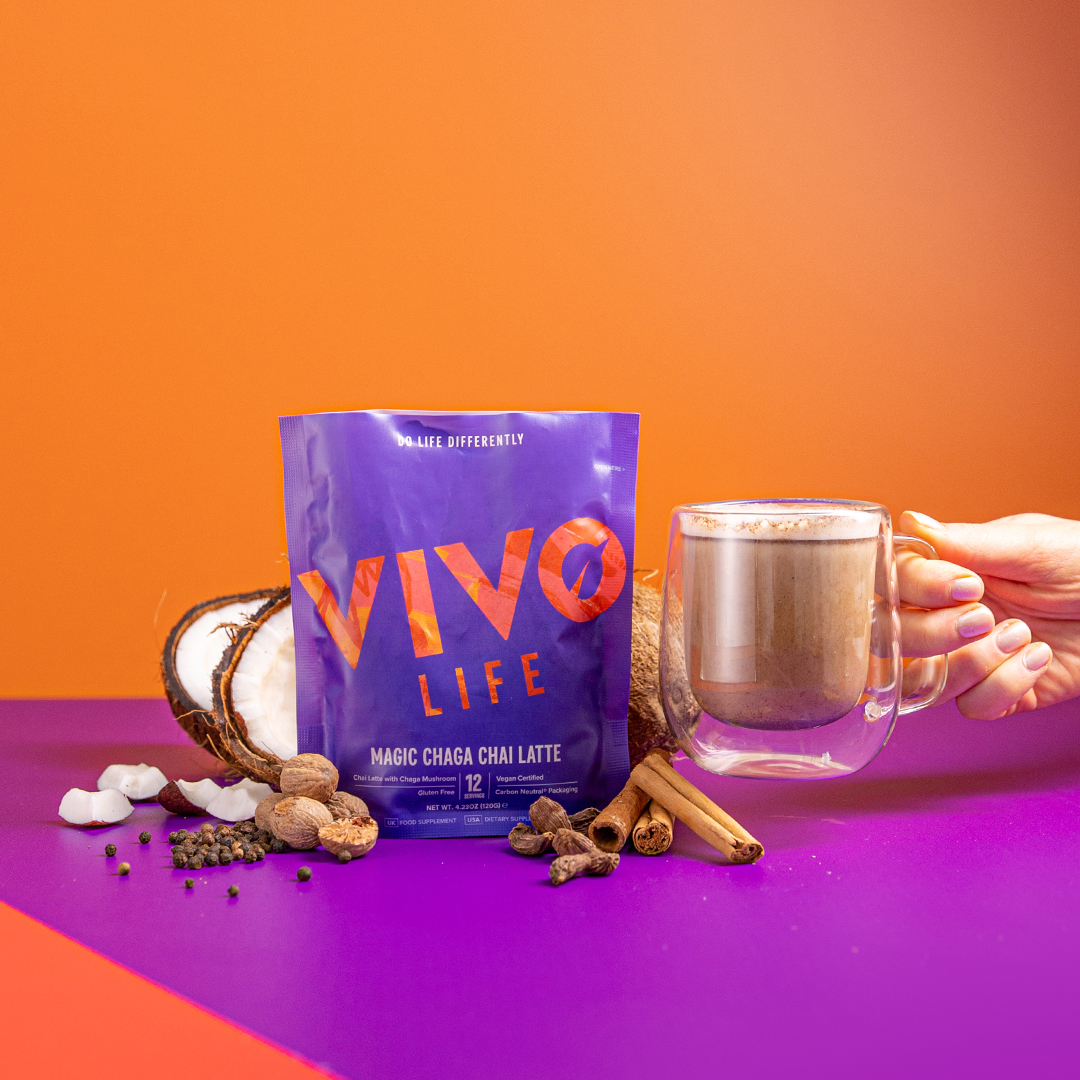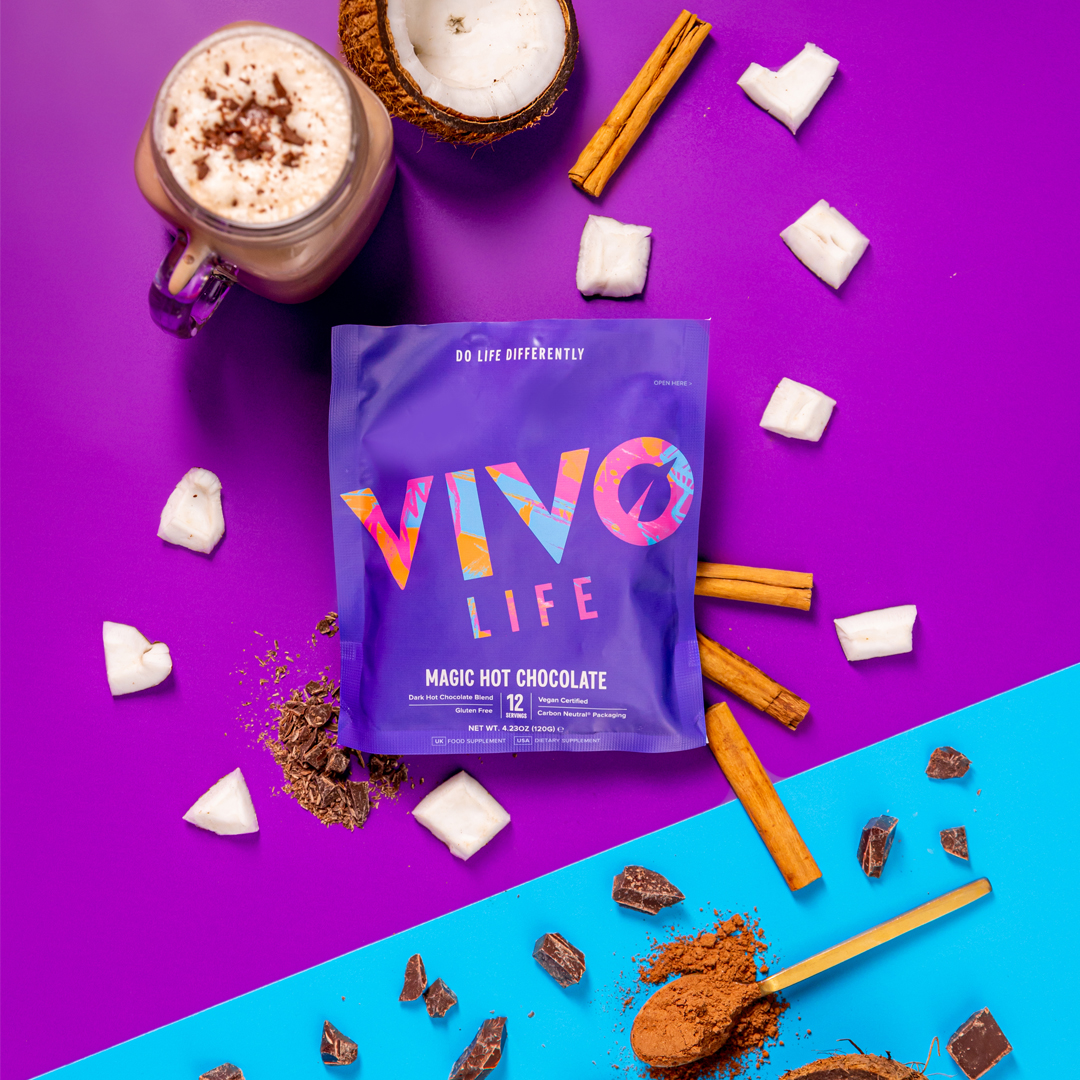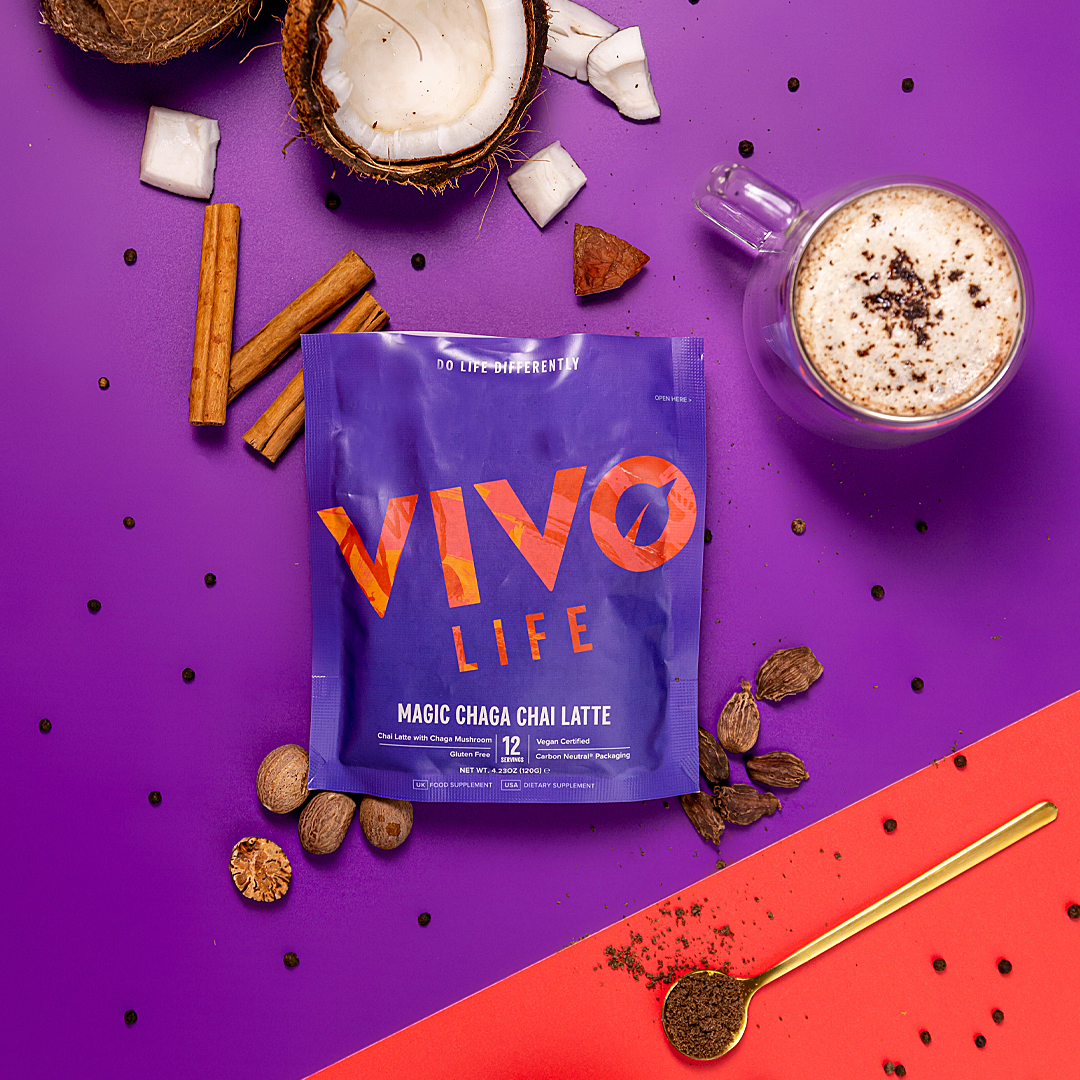MAGIC LATTE AND HOT CHOCOLATE
Updated
by Kat Hoyle
Our Magic Chaga Chai Latte and Magic Hot Chocolate gives these wonderful ingredients, medicinal mushrooms centre stage. Each drink gives the limelight to a particular mushroom, each with particular bio-active benefits that support us in different aspects of health and wellness.

What is a medicinal mushroom?
Medicinal mushrooms are a unique subset of the fungi kingdom, revered for their healing and healthful properties and have been used for millennia in ancient healing practices like Ayurveda and Ancient Chinese medicine. Celebrated for a multitude of health benefits they belong to a group of plants called adaptogens. Adaptogens are a group of plants and herbs that can help us to manage and balance mood, energy levels, stress hormones within the body, and even enhance cognitive function. Modern nutritional science has been exploring this in more recent years and is re-discovering the bio-active benefits that our ancestors celebrated. We love these wonderful mushrooms and you will find them in many of our products. However, we felt they deserved their own dedicated limelight and so was born MAGIC.
Are they safe?
Medicinal mushrooms are 100% legal and do not have psychoactive effects as they do not contain psychotropic compounds, you will not be “high” after drinking Magic. Those are very different mushrooms! The health benefits you may experience however in our opinion are truly Magic. They are of course safe to consume, but as with anything you can have too much of a good thing so, please stick to the recommended amounts on the packaging.
What mushrooms do we use?
There are many different medicinal mushrooms, all with their own distinct benefits. They do all share some benefits including anti-inflammation, high in antioxidants, ability to help balance the stress response, to name a few. The healthful benefits are largely attributed to the mushrooms polysaccharide content which seem to enhance innate and cell-mediated immune responses. Each of the mushrooms featured in our Magic range is present at a functional dose. This means an amount the body can actually use and benefit from, rather than an insignificant amount. Each magic flavour of Magic has one mushroom as the focused functional ingredient.
Why we only use the fruiting body
In simplistic terms there are two main parts to mushroom, the mycelium (the wispy, cobweb like network that is mostly underground, the root system of the mushroom) and the fruiting body (the actual fruit that is (usually) above the ground (think mushroom emoji!)). The fruiting body is where the most nutrients and bio-active compounds are concentrated, which is why we always use the fruiting body in our products.
7,500mg Reishi mushroom per serving (from 500mg of 15:1 extract).

Cacao is chocolate in its purest, natural form. The cacao beans grow in a large pod, usually in Central/South America and Africa, and provide an abundance of nutritional benefits and has many applications to health and wellbeing. Raw cacao is rich in magnesium, copper, potassium, iron, zinc, and brain supporting flavanols. It is considered sacred medicine by some Indigenous cultures and has long been revered for its healing properties. Cacao has been researched for a multitude of benefits, of which are largely attributed to the high concentration of the bio-active flavanol compounds, procyanidins and epicatechins. Bio-flavanols have antioxidant properties, and aid in the absorption and utilization of some nutrients.
The antioxidant levels of Cacao even exceed superfoods like goji berries and acai, having far reaching health benefits for our skin, brain, and heart health to name a few.
More celebrated benefits of Cacao include its high levels of Magnesium which is well known to optimize central nervous system (CNS) function, in fact it is essential to normal neurological and muscular function. Magnesium also supports brain health alongside many other bodily systems. Consuming Raw Cacao is a tasty way to contribute towards your magnesium RDA (recommended daily amount).
Cacao is considered an anti-inflammatory food due to its high concentrations of antioxidants, these help to fight free radicals, protect against environmental toxins which both help to manage inflammation in the body, encouraging overall wellness and longevity.
The mushroom taking center stage our hot chocolate is Reishi. We use sustainably harvested Reishi fruiting body extract (30% polysaccharides), from its natural habitat in China.
Reishi (Ganoderma lucidum) is an adaptogenic mushroom that has been celebrated in Eastern medicine for millennia for its far-reaching healthful benefits, it was known in Chinese Medicine as Lingzhi which translates as the “mushroom of immortality”. It has been used for its medicinal potential for over 4000 years, and documented in many ancient manuscripts. The ancients believed Reishi could help you to lead a long and vibrant life, and whilst Reishi may not make you live forever, its potential to positively affect health on a whole-body level is vast. Traditionally Reishi was used by Taoist monks in China to encourage calmness, tranquil states, improve meditation and focus and to encourage longevity. The mushroom was incredibly rare and was often reserved only for those of a higher social status, cherished by Emperors and holy men alike.
Reishi has a variety of healthful functions, but they mostly focused on supporting healthy immune system functioning. Reishi is able to downregulate the immune system on the occasions where it is over functioning (think auto immune disorders), and rebuild the immune system when it is weakened. It does this by increasing the amount on immune system cells that are active in our biosystems. This has quite profound implications for health, meaning Reishi is a wonderful “all-rounder” support mushroom for wellness and longevity.
In traditional medicine, Reishi was often used to help support healthy sleep cycles and a treatment for restlessness and insomnia. Modern animal studies have explored this, as well as some human studies. The consensus is that reishi can support our natural circadian rhythm (our sleeping and waking cycles) due to its mild tranquilizing effects, resulting from Reishi’s balancing effect on the central nervous system.
Reishi is a powerful mushroom with far reaching potential benefits not limited to the above. We also include Reishi in some flavours of our product Perform Plant Protein, because of its positive effect on many bodily systems.
Our Magic Hot Chocolate contains only natural ingredients which may form small clumps whilst on it's way to you. This is completely normal and they will dissolve once made into a delicious drink.
4,500mg Chaga mushroom per serving (from 750mg of 6:1 extract).

Chaga is a charcoal like fungus that primarily grows on birch trees and has been considered a “cure-all” by traditional medicine practices. This all-rounder mushroom has been explored for many potential healthful applications, across almost all bodily systems. These potential benefits are due to a cocktail of bioactive compounds found in chaga; polyphenols, melanin, triterpenoids and polysaccharides of which polysaccharides are the most researched in vivo and in vitro, in animal and some human studies.
Our chaga is sustainably sourced from China, where it has been used in traditional medicine for 100s of years. There is 4,500mg of chaga per serving of Chaga Chai Latte.
Polysaccharides from chaga are believed to have immuno-stimulating benefits and a positive effect on macrophage activity (macrophages are immune cells that destroy viruses, pathogens, fungi, tumorous cells). Chaga is a natural anti-inflammatory, antioxidant, hepatoprotective and anti-bacterial, all of which play a role in supporting overall wellness and longevity and useful in preventative nutrition.
Chai is a traditional blend of spices originating from India. There are countless different variations of blends from different regions and traditions. Our blend was inspired by a classic blend of warming spices; cinnamon, ginger, cardamon and nutmeg. These spices all have healthful benefits when consumed in functional amounts. Here they are mostly present for their wonderful flavours.
Our Chaga Chai Latte is a not-for-profit product. We donate all net profits to the Akanksha Education Fund either in line with the overall net profit margins of the business, or at a minimum of £1 for each pack sold (whichever is greater). For example, if the business runs at a 12% profit margin then 12% of all proceeds from Chaga Chai Latte will be donated to the Akanksha Education Fund. However in order to safeguard donations to the Akanksha Education Fund, even if profit margins are below 7.5% we will donate a minimum of £1 for each pack sold.

References
Betül Kocaadam, Nevin Şanlier. (2017). Curcumin, an active component of turmeric (Curcuma longa), and its effects on health. Critical Reviews in Food Science and Nutrition. 57 (13), 2889-2895.
Dong Pil Won, Jong Seok Lee, Duck Soo Kwon, Keun Eok Lee, Won Cheol Shin, Eock Kee Hong. (2011). Immunostimulating activity by polysaccharides isolated from fruiting body of Inonotus obliquus. Molecules and Cells. 31 (2), 165-173.
E V Kolotushkina, M G Moldavan, K Yu Voronin, G G Skibo. (2003). The influence of Hericium erinaceus extract on myelination process in vitro. Fizoil Zh.. 49 (1), 38-45.
Gitishree Das et al.,. (2020). Cordyceps spp.: A Review on Its Immune-Stimulatory and Other Biological Potentials. Front Pharmacol.. 11 (3), 567-571.
Jasmina Glamočlija, Ana Ćirić, Miloš Nikolić, Ângela Fernandes, Lillian Barros, Ricardo C. Calhelha, Isabel C.F.R. Ferreira, Marina Soković, Leo J.L.D. van Griensven. (2015). Chemical characterization and biological activity of Chaga (Inonotus obliquus), a medicinal “mushroom”. Journal of Ethnopharmacology. 162 (1), 323–332.
Katie R. Hirsch, Abbie E. Smith-Ryan, Erica J. Roelofs, Eric T. Trexler, and Meredith G. Mock. (2017). Cordyceps militaris improves tolerance to high intensity exercise after acute and chronic supplementation. J Diet Supple.. 14 (1), 42-53.
Koichiro Mori, Satoshi Inatomi, Kenzi Ouchi, Yoshihito Azumi, Takashi Tuchida. (2009). Improving effects of the mushroom Yamabushitake (Hericium erinaceus) on mild cognitive impairment: a double-blind placebo-controlled clinical trial. Phytotherapy Research. 23 (3), 367-372.
Koichiro Mori, Yutaro Obara, Mitsuru Hirota, Yoshihito Azumi, Satomi Kinugasa, Satoshi Inatomi, Norimichi Nakahata. (2008). Nerve growth factor-inducing activity of Hericium erinaceus in 1321N1 human astrocytoma cells. Biological & Pharmaceutical Bulletin. 31 (9), 1727-1732.
Lian-ying Liao, Yi-fan He, Li Li, Hong Meng, Yin-mao Dong, Fan Yi, Pei-gen Xiao.. (2018). A preliminary review of studies on adaptogens: comparison of their bioactivity in TCM with that of ginseng-like herbs used worldwide. Chinese Medicine BMC. 13 (57), 56-64.
S Atagi, S Sone, K Fukuta, T Ogura. (1991). Inhibition by fibrin coagulation of lung cancer cell destruction by human interleukin-2-activated killer cells. Japanese Journal of Cancer Research.. 83 (10), 1088-1094.
Solomon P. Wasser. (2007). Neurotropic and Trophic Action of Lion's Mane Mushroom Hericium erinaceus (Bull.: Fr.) Pers. (Aphyllophoromycetideae) Extracts on Nerve Cells in Vitro. International Journal of Medicinal Mushrooms. 1 (1), 15-28.
Solomon P. Wasser. (2017). Medicinal Mushrooms in Human Clinical Studies. Part I. Anticancer, Oncoimmunological, and Immunomodulatory Activities: A Review. International Journal of Medicinal Mushrooms. 19 (4), 279-317.
Qing-Ping Chu, Li-En Wang, Xiang-Yu Cui, Hong-Zheng Fu, Zhi-Bin Lin, Shu-Qian Lin, Yong-He Zhang. (2007). Extract of Ganoderma lucidum potentiates pentobarbital-induced sleep via a GABAergic mechanism. Pharmacology, Biochemistry and Behaviour.. 84 (4), 693-698.
Yihuai Gao, Shufeng Zhou, Wenqi Jiang, Min Huang, Xihu Dai. (2003). Effects of ganopoly (a Ganoderma lucidum polysaccharide extract) on the immune functions in advanced-stage cancer patients. Immunological Investigations.. 32 (3), 201-215.
Yu-Hong You, Zhi-Bin Lin. (2002). Protective effects of Ganoderma lucidum polysaccharides peptide on injury of macrophages induced by reactive oxygen species. Acta Pharmalogica Sinica. 23 (9), 787-791.
Xiao Chen, Ze-Ping Hu, Xiao-Xia Yang, Min Huang, Yihuai Gao, Wenbo Tang, Sui Yung Chan, Xihu Dai, Jinxian Ye, Paul Chi-Liu Ho, Wei Duan, Hong-Yuan Yang, Yi-Zhun Zhu, Shu-Feng Zhou. (2006). Monitoring of immune responses to a herbal immuno-modulator in patients with advanced colorectal cancer. International Immunopharmacology.. 6 (3), 499-508.
Zhi-Bin Lin . (2005). Cellular and molecular mechanisms of immuno-modulation by Ganoderma lucidum. Journal of Pharmacological Sciences. 99 (2), 144-153.
